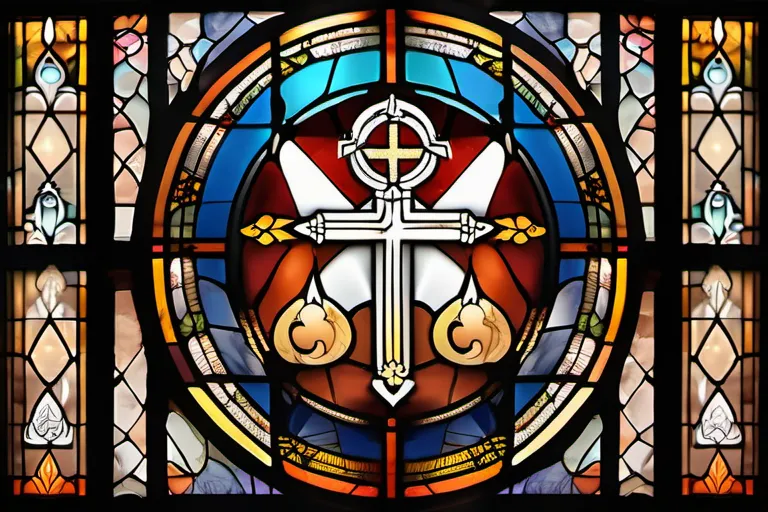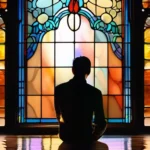Exploring the philosophical, scientific, and religious perspectives on the existence of a supreme being.
Delve into the age-old question that has puzzled humanity for millennia: Is there evidence of God’s existence? In this article, we will explore various arguments from philosophy, science, and religion to shed light on this profound topic.
The Philosophical Approach to God’s Existence
Is there evidence of God’s existence? A comprehensive investigation into this age-old question reveals a rich tapestry of philosophical arguments, each weaving its unique thread through the fabric of human thought and belief. Let’s dive deep into the philosophical approach to explore if these threads can hold up under scrutiny.
The ontological argument, proposed by medieval philosopher Anselm of Canterbury, asks us to consider whether God’s existence is a necessary truth. Is it possible that a being so perfect could not exist? If such a being exists in our minds and we understand its perfection, then logically, it must also exist in reality. This argument hinges on the idea that perfection demands existence; can you imagine a perfect being that doesn’t exist?
On the other hand, let’s consider the cosmological argument, which posits that everything that exists has a cause and thus, there must be an uncaused first cause – God. Here, we are asked to think about the origins of the universe and whether it is reasonable to assume an eternal, self-sustaining entity as its beginning. Is the concept of a timeless, changeless being too abstract or does it provide a satisfying explanation for our existence?
The teleological argument, or design argument, suggests that complexity in nature points to a designer – God. Could the intricate workings of nature be attributed solely to chance and natural selection? Or is there a higher intelligence at play, guiding evolution towards complex life forms? This argument often uses analogies: just as we recognize design when looking at a watch, can’t we see similar signs of design in the universe?
These arguments have been debated for centuries, with each one presenting compelling reasoning but also facing significant challenges. The ontological argument is met with criticism that it relies heavily on circular logic; the cosmological argument faces questions about infinite regress and the nature of causality; while the teleological argument can be seen as projecting human intelligence onto natural phenomena.
Are these arguments enough to prove God’s existence? Or do they merely reflect our desire for meaning and order in an otherwise chaotic world? As we delve into the scientific perspective, we will explore if these philosophical threads are reinforced or challenged by empirical evidence. In either case, the journey of investigation invites us to question deeply and perhaps find answers that lie beyond simple yes or no.
Scientific Evidence for God’s Existence
Scientific evidence for God’s existence? It’s a question that has puzzled and intrigued humans for centuries, leading us to explore the intricate workings of our universe through scientific lenses. Could it be that the very fabric of reality points towards a divine creator? Let’s dive into some intriguing theories.
The fine-tuning argument is one such theory that suggests the universe’s constants and conditions are so precisely balanced for life to exist, it implies an intelligent designer. Imagine the universe as a finely crafted watch—every cog, every gear, must be just right for it to function properly. Could this complexity arise by chance? Or could it suggest there’s a master watchmaker at work?
Another fascinating concept is the anthropic principle. This suggests that if certain universal conditions were even slightly different, life as we know it wouldn’t exist. It’s like playing a cosmic game of Jenga—shift any block and the entire structure could collapse. But here’s the twist: our existence ensures that only those blocks have been in place just right for us to be here.
These theories, while compelling, also pose questions. Is the universe too finely tuned by chance or necessity? Could there be a multiverse where countless universes exist with different constants and conditions, making ours seem less miraculous?
While these scientific arguments don’t provide concrete answers, they certainly spark curiosity. They hint at the possibility that perhaps our existence is more than just a random cosmic accident. As we continue to explore the cosmos, each new discovery could bring us closer—or further away—from understanding the ultimate question of whether there’s a divine hand guiding the universe.
Religious Perspectives on God’s Existence
Religious perspectives on God’s existence are as varied and diverse as the cultures they come from. Each major religion has its own unique beliefs, arguments, and scriptures that provide evidence for the existence of a supreme being. Let’s take a closer look at some of these perspectives.
Christianity: For Christians, the belief in God is deeply rooted in their faith, with the Bible serving as the primary source of truth. The Christian perspective often hinges on the concept of a personal, loving God who created the universe and has interacted directly with humanity through prophets like Moses and Jesus Christ. Rhetorical questions such as “How can we explain the moral order found throughout history if not for divine intervention?” or “Why do bad things happen to good people without a higher power guiding us?” are often used to argue for God’s existence.
Islam: In Islam, God (Allah) is seen as the sole creator and sustainer of all that exists. The Qur’an and Hadith offer numerous verses and teachings that support this belief. Islamic scholars argue that the complexity and precision of the natural world point to a divine designer. Rhetorical questions like “How can the intricate design of nature be explained without acknowledging an intelligent Creator?” are frequently posed.
Judaism: Judaism’s approach is more philosophical, focusing on the idea of a transcendent God who exists beyond creation but maintains a connection with humanity through commandments and covenants. The Talmud and other texts explore the concept that the existence of evil in the world necessitates a creator who has a purpose for allowing suffering. Questions such as “If there is no God, why does history have any meaning?” are central to Jewish theological discourse.
Hinduism: Hinduism presents a more pantheistic perspective where Brahman (the ultimate reality) and Isvara (a personal aspect of Brahman) coexist. The Bhagavad Gita and other texts suggest that the universe is an illusion created by God to test human souls. Hindu arguments often revolve around the idea that the universe, with its countless manifestations and cycles, cannot be explained without a divine force. Questions like “How can the infinite complexity of creation arise from nothing?” are frequently discussed.
Buddhism: While not traditionally centered on belief in a personal God, some Buddhist traditions do acknowledge a higher reality or cosmic order. The concept of Dharma (the natural law) and Karma (cause and effect) often serve as metaphysical frameworks that indirectly suggest the existence of a divine principle governing the universe. Rhetorical questions might include “How can we find ultimate peace without acknowledging a cosmic harmony guided by higher principles?”
Each of these religions offers profound insights into their understanding of God’s existence, intertwining personal beliefs with complex philosophical and spiritual inquiries. By examining these perspectives, one gains a richer appreciation for the multifaceted nature of religious thought.
The Argument from Design
Could the intricate complexity and orderliness we observe in the universe be mere coincidence? Many have pondered this question, suggesting that such design points to the existence of a supreme being. The argument from design is a powerful one, weaving through the fabric of our natural world like an unseen thread, hinting at a masterful creator behind it all.
Imagine a watch and its intricate mechanism. Who would argue that such complexity just happened by chance? Yet, when we look at the universe’s vast array of systems—from the microscopic to the cosmic—we are left with similar questions. Could this not also be the work of a designer?
The argument from design can be seen as a metaphorical telescope pointing towards the heavens. It magnifies the grandeur and complexity of our world, inviting us to see beyond the mundane and into the realm of possibility for a purposeful creator. However, just like any powerful tool, it requires careful handling and interpretation.
Proponents of this argument argue that the sheer complexity and order in nature cannot be explained by random chance or natural processes alone. They liken life on Earth to a finely tuned machine, where each part is designed for specific functions, much like organs in a human body. This intricate design, they claim, can only be attributed to an intelligent designer.
However, critics often argue that the complexity we observe could emerge from natural processes over vast periods of time through evolution and adaptation. They suggest that randomness and necessity together might explain the world’s complexity without invoking a designer.
So, is the universe designed or is it merely complex? This question remains at the heart of philosophical debates about the existence of God. While proponents see the design as undeniable evidence for a creator, skeptics argue that natural processes can account for such intricacy. The debate continues, with each side offering compelling arguments and counterarguments.
As we delve deeper into this discussion, it becomes clear that the argument from design, while powerful in its simplicity, is also fraught with complexities. It opens up a vast landscape of philosophical inquiry, inviting us to question our understanding of the universe and our place within it.
The Problem of Evil
The problem of evil, one of the most profound and perplexing challenges to the existence of God, has long haunted philosophical inquiries into religious beliefs. How can a benevolent and omnipotent God allow such widespread suffering in His creation? This question is like asking why a master gardener would let his flowers wither or a sculptor watch his masterpiece crumble. If He is all-powerful, He could prevent evil; if He is wholly good, He wouldn’t permit it.
Imagine, for a moment, a perfectly crafted symphony. Every note plays its part in harmony and beauty. Now, imagine that same orchestra playing off-key or even stopping abruptly. How does this disruption fit into the grand design? This metaphor captures the essence of evil’s presence: if God is the conductor orchestrating everything for the best, why are there moments when His baton seems to falter?
Atheists and skeptics often point to the existence of evil as a rebuttal to the argument from design. They argue that such suffering undermines the idea that a loving creator designed our world. But consider this: if God is both all-powerful and all-good, how might He reconcile His attributes with human free will? Perhaps the very essence of being able to choose good or evil introduces the possibility of suffering as a consequence.
The problem of evil also challenges us to reflect on our own role in addressing suffering. Should we see ourselves as co-creators, working alongside God to mitigate pain and suffering? Or are we merely spectators, observing from a detached perspective while the symphony plays out its tragic notes?
In exploring these questions, we delve into the depths of human existence, questioning not just the presence of evil but also the nature of our relationship with God. The problem of evil is not merely about logical consistency; it’s a call to consider the full spectrum of emotions and experiences that shape our understanding of the divine.
Conclusion: The Persistence of Doubt
After delving into the myriad perspectives on the existence of God, we are left with one lingering question: Is there evidence of God’s existence? The investigation has led us through the labyrinthine corridors of philosophy, science, and religion, each offering unique insights but leaving many doors ajar.
The philosophers have painted a picture where faith and reason coexist like two rivers meeting at a bend. Some argue that while evidence may be elusive, the possibility remains. Others suggest that the complexity of the universe demands an explanation beyond human comprehension, much like how one might appreciate a masterpiece without fully understanding its creation process.
Science, with its methodical approach to evidence, provides a different lens. Some studies hint at phenomena that defy current scientific explanations, leaving room for the supernatural. Yet, as we have seen in The Problem of Evil, these same scientific advancements raise questions about the benevolence and omnipotence of a supreme being. How can such power coexist with the existence of suffering?
Religion offers perhaps the most direct confrontation: faith-based arguments assert that evidence lies within the hearts and minds of believers, who see divine presence in their lives and experiences. Critics counter by asking if such subjective experiences are sufficient to validate a universal deity.
The implications for those who believe or disbelieve are profound. For believers, this exploration may deepen their understanding and appreciation of their faith, revealing layers previously unseen. Non-believers might find themselves questioning their skepticism, as the complexity and beauty of existence challenge their materialist views.
As we stand at this crossroads, the debate persists, fueled by new discoveries, shifting societal values, and evolving personal experiences. The quest for evidence may never yield a definitive answer, but it does offer us a chance to engage with some of life’s most profound questions. In the end, perhaps the journey itself is the true proof—of our humanity, our curiosity, and our relentless search for meaning in an often chaotic world.
Conclusion
 Upon careful examination of the evidence presented, it becomes clear that while no definitive proof exists, the question of God’s existence remains a deeply personal and thought-provoking one for many individuals.
Upon careful examination of the evidence presented, it becomes clear that while no definitive proof exists, the question of God’s existence remains a deeply personal and thought-provoking one for many individuals.











